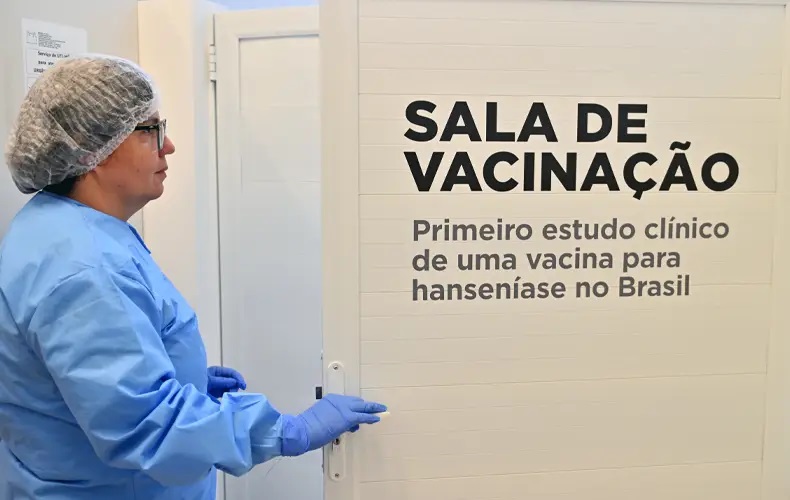
The Oswaldo Cruz Institute (IOC), of the Oswaldo Cruz Foundation (Fiocruz) will be responsible for leading a historic clinical trial for global public health: a stage in the development of a vaccine against leprosy. The National Health Surveillance Agency (Anvisa) on Monday (14) approved the implementation of tests on humans, and, if the study gets the desired answers, this could be a way for Brazilians to get a free vaccine against the virus. disease.
As the first leprosy vaccine candidate, LepVax was developed by the Access to Advanced Health Institute (AAHI), an American non-profit biotechnology research institute. With modern protein subunit technology, the vaccine has had promising preclinical testing against the bacterium Mycobacterium leprae, which causes the disease.
Before reaching the human research stage in Brazil, which will involve 54 volunteers, the safety of the vaccine has been proven in tests on 24 healthy people in the United States. The study demonstrated the safety of the vaccine, and no serious side effects were reported. It also exhibits immunogenicity, that is, the ability to stimulate an immune response.
With testing in Brazil, researchers will be able to observe the effects of LepVax in areas with leprosy transmission. Brazil concentrates 90% of cases of this disease on the American continent and is also the second country in the world in the number of notifications of this disease, after India. In ten years, from 2014 to 2023, there were almost 245 thousand new infections, according to the Ministry of Health in 2023 alone, 22,773 new cases were recorded.
Therefore, considering the epidemiological scenario in the country, the researchers believe that the immune system of most Brazilians may have had previous contact with mycobacteria, which could influence the response to the vaccine.
The Head of the Leprosy Laboratory at IOC/Fiocruz, Roberta Olmo, highlighted that the clinical trials of LepVax at the Fiocruz institute reflect the level of maturity achieved over many years of the laboratory’s pioneering work, which has allowed it to gain recognition from national societies and international scientific research.
“Sustainable elimination of leprosy as a public health problem requires a vaccine. In this scenario, LepVax emerges as a prophylactic and therapeutic vaccine, which can contribute to disease control goals,” he said.
Combating leprosy falls within the purview of the Inter-Ministerial Committee for the Elimination of Tuberculosis and Other Social Diseases (Cieds), which was created in June. The group, which consists of nine departments, is led by the Ministry of Health to find solutions to neglected diseases, which are often linked to poverty and other social determinants.
For leprosy, the targets include stopping transmission in 99% of cities, eliminating the disease in 75% of cities, and reducing the absolute number of new cases with physical disabilities at diagnosis by 30% by 2030.
Three doses
The Oswaldo Cruz Institute will evaluate the safety and immunogenicity of the vaccine, in addition to investigating the use of two different vaccine formulations, with low and high doses of antigen. To do this, participants will be randomly divided into three groups: two groups will receive the vaccine, one with a low dose and one with a high dose; and a third group will receive a placebo, namely a saline solution, with no biological effects.
Each participant will receive three doses of the application according to their group, with an interval of 28 days. After that, they will be followed up for one year. To participate, you must be between 18 and 55 years old, in good health and not pregnant. In addition, volunteers must not be people who have previously had the disease or have had close contact with leprosy sufferers.
Dermatologist and researcher at the Souza Araújo Outpatient Clinic, Cássio Ferreira, explained in a text published by the Oswaldo Cruz Institute that the safety of the vaccine will be assessed through clinical monitoring and laboratory tests. “In America, the results have been very positive, with no major adverse effects. Recorded reactions, such as pain at the injection site, fatigue and headaches, are common with immunization. This first safety demonstration is important for research to move forward.”
The Oswaldo Cruz Institute was selected as the clinical center responsible for the testing and the Institute of Immunobiology Technology (Bio-Manguinhos/Fiocruz) was the sponsor of the clinical trial. The LepVax project is funded by the philanthropic arm American Leprosy Missions (ALM), from the United States, which has led vaccine development since 2002. Research in Brazil is also financed by the Ministry of Health and the Japanese fund Global Health. Innovative Technology Fund (GHIT Fund). Sasakawa Health Foundation, of Japan, is a research partner.
To stay up to date with other news and receive exclusive content fromEM TIME Portalaccess our channels onWhat is it. Click here and join us! 🚀📱





